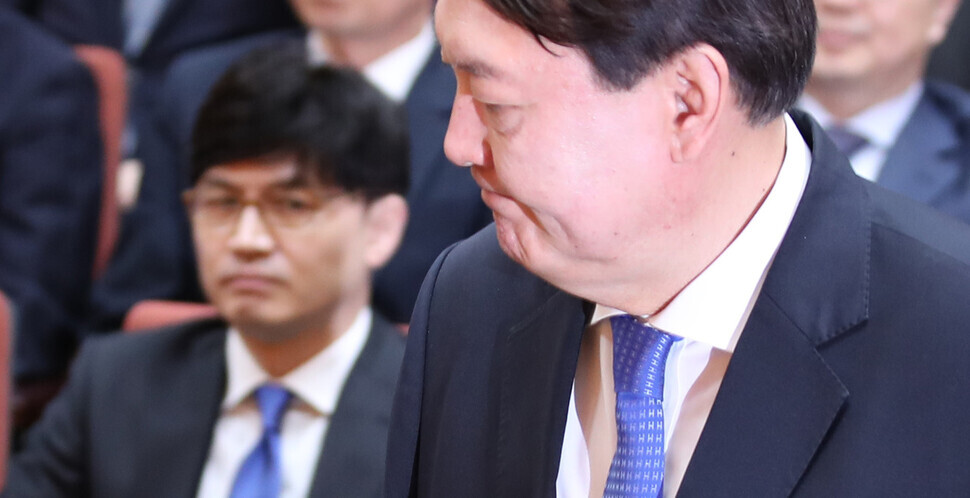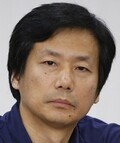hankyoreh
Links to other country sites 다른 나라 사이트 링크
[Column] The immortal authority of prosecutors and their undying control of S. Korea’s political processes

More people are asking if prosecutorial reform has to be so messy. They point out that the endless feud between Justice Minister Choo Mi-ae and Prosecutor General Yoon Seok-youl only adds to Korea’s mounting economic distress. The ruling party should certainly pay heed to such criticism. But what’s just as clear is that the drive for prosecutorial reform should not be halted here, when it has drawn so near to its goal.
That goal is to redistribute some of the prosecution service’s immense power and set up checks and balances. Why is that important? What I’d personally like to emphasize is that this would end the era of excessive prosecutorial authority that allows prosecutors to willfully intervene in and disrupt democratic processes, which are supposed to operate through public choice and delegation of authority.
Korea has a long history of politics being dominated by unelected forces. The military junta ruled with an iron fist until democratization, after which its influence rapidly shriveled. But those democratic controls didn’t fully extend to bureaucratic institutions. If anything, the growing importance of the nominal rule of law further empowered the prosecution service, which is one of such institutions.
Under authoritarian regimes, at least, the prosecutors were tamed and controlled by appointing former prosecutors as justice minister and Blue House senior secretary for civil affairs. Former President Roh Moo-hyun gave the prosecutors free rein and didn’t intervene at all in their investigations. But that turned out to be a mistake: with their independence guaranteed and no checks on their authority, the prosecutors ran amok.
Current President Moon Jae-in has opted for a system of checks and balances without interfering in prosecutorial investigations. This has provoked a backlash from the prosecutors, who are unwilling to lose what they see as their key prerogatives — that’s the current situation in a nutshell.
The prosecutor general’s unmatched power in the political systemIn short, the prosecutors see this as their last chance to undermine the legitimacy of reform before the office for investigating corruption by high-ranking officials and plans to redistribute the prosecutors’ investigative authority take effect.
That’s only possible because South Korea’s prosecution service is an immensely powerful law enforcement body with the sole authority to both carry out investigations and make indictments, a model without precedent in the world.
That service is also a vertical hierarchy, with the prosecutor general at the top. Under such an imperial power structure, the prosecutor general can exercise monopolistic authority with ruthless efficiency.
Korean society has shuddered at the fearsome consequences of that power. When Cho Kuk was appointed as justice minister, Yoon sought to overturn that appointment by launching an investigation on an unprecedented scale, digging up everything from questionable award certificates to hedge funds. That investigation made a mockery of political processes, including the president’s authority to make appointments and confirmation hearings at the National Assembly. Even now, the investigation has failed to turn up any serious charges of corruption.
After that, the prosecution service focused its resources on allegations of meddling in the Ulsan mayoral elections. Prosecutors cobbled together an indictment that mentioned the president’s title 35 times and misrepresented public opinion polls, without providing a single shred of evidence. That gave the political opposition (then under the banner of the United Future Party) grounds to demand an impeachment of the president. Such actions, coming as they did before the general elections on Apr. 15, 2020, raised suspicions that the prosecution service was attempting to overturn the people’s choice.
The collusion of prosecutors and reactionary mediaThe prosecutors’ excessive and targeted investigations sometimes appear to be coordinated with the reactionary press and the conservative opposition. Investigations into conservative figures have gone nowhere or collapsed, and the prosecutor general has met with the owners of the Chosun Ilbo and Joongang Ilbo. This has created a positive feedback loop in which the prosecutors’ investigations are inflated by the reactionary media, causing the prosecutors to then expand those investigations.
One particular example of the unholy alliance between the prosecutors and the press occurred before the general elections this year, when a reporter on Channel A suggested that senior prosecutor Han Dong-hoon should dig up dirt on progressive YouTuber Rhyu Si-min. “That’s worth trying,” Han responded, adding, “and anything we can dig up would be enough.” That laid bare the desire of vested interests to undermine voters’ choice. Yoon did everything in his power to defend Han after the incident was brought to light.
There’s a magical phrase that the prosecutors like to bring up whenever doubts are raised about their impartiality: namely, the claim that justice consists of investigating the powers that be. That simple phrase repackages investigative excess as grit and investigative bias as restoring balance against those who are in and out of power — referred to in Korean as “living power” and “dead power.”
Dead power, living power, and the undying power of the prosecutorsBut those are just metaphors. In a democratic system, even the “dead power” of the opposition party enjoys “living power” commensurate to its seats in the legislature. In fact, the prosecutors should be seen as having “undying power,” since they continue to wield power as administrations come and go.
Justice means carrying out fair and neutral investigations into corruption carried out by powerful people of all kinds. But Yoon’s perplexing comment that “prosecutorial reform means investigating ‘living power’” dispenses with political neutrality and attempts to justify “selective justice” — with the selections being made, to be sure, by the prosecution service.
Political scientists and sociologists today are united in warning that government institutions, when left unchecked, accumulate power to themselves. Prosecutorial reform means ending the political interventions of the unelected “undying power” and putting it in its proper place.

By Son Won-je, editorial writer
Please direct comments or questions to [english@hani.co.kr]

Editorial・opinion
![[Editorial] Penalties for airing allegations against Korea’s first lady endanger free press [Editorial] Penalties for airing allegations against Korea’s first lady endanger free press](https://flexible.img.hani.co.kr/flexible/normal/500/300/imgdb/original/2024/0502/1817146398095106.jpg) [Editorial] Penalties for airing allegations against Korea’s first lady endanger free press
[Editorial] Penalties for airing allegations against Korea’s first lady endanger free press![[Editorial] Yoon must halt procurement of SM-3 interceptor missiles [Editorial] Yoon must halt procurement of SM-3 interceptor missiles](https://flexible.img.hani.co.kr/flexible/normal/500/300/imgdb/child/2024/0501/17145495551605_1717145495195344.jpg) [Editorial] Yoon must halt procurement of SM-3 interceptor missiles
[Editorial] Yoon must halt procurement of SM-3 interceptor missiles- [Guest essay] Maybe Korea’s rapid population decline is an opportunity, not a crisis
- [Column] Can Yoon steer diplomacy with Russia, China back on track?
- [Column] Season 2 of special prosecutor probe may be coming to Korea soon
- [Column] Park Geun-hye déjà vu in Yoon Suk-yeol
- [Editorial] New weight of N. Korea’s nuclear threats makes dialogue all the more urgent
- [Guest essay] The real reason Korea’s new right wants to dub Rhee a founding father
- [Column] ‘Choson’: Is it time we start referring to N. Korea in its own terms?
- [Editorial] Japan’s rewriting of history with Korea has gone too far
Most viewed articles
- 160% of young Koreans see no need to have kids after marriage
- 2[Editorial] Penalties for airing allegations against Korea’s first lady endanger free press
- 3Months and months of overdue wages are pushing migrant workers in Korea into debt
- 4Bills for Itaewon crush inquiry, special counsel probe into Marine’s death pass National Assembly
- 5[Reporter’s notebook] In Min’s world, she’s the artist — and NewJeans is her art
- 6[Guest essay] Maybe Korea’s rapid population decline is an opportunity, not a crisis
- 71 in 3 S. Korean security experts support nuclear armament, CSIS finds
- 8S. Korea discusses participation in defense development with AUKUS alliance
- 9Cracks found in containment building of UAE nuclear power plant built by S. Korean companies
- 10At heart of West’s handwringing over Chinese ‘overcapacity,’ a battle to lead key future industries